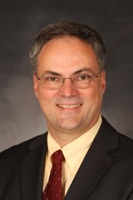 Dr. Christopher Thompson, academic dean of St. Paul Seminary, and NCRLC Board member presented on reclaiming our Catholic heritage in the understanding of agriculture at our special session at the annual Catholic Social Ministry Gathering in Washington, DC. He asks how we can reclaim the creative good in modern agriculture, applying a Catholic philosophy of nature and the human person.
Dr. Christopher Thompson, academic dean of St. Paul Seminary, and NCRLC Board member presented on reclaiming our Catholic heritage in the understanding of agriculture at our special session at the annual Catholic Social Ministry Gathering in Washington, DC. He asks how we can reclaim the creative good in modern agriculture, applying a Catholic philosophy of nature and the human person.
A companion piece of his presentation is featured in our Winter magazine issue.
Dr. Thompson begins by quoting the 19th-century Jesuit priest poet, Gerard Manley Hopkins, who wrote elegantly about his beloved English countryside before the abuses of industrialization took hold. Dr. Thompson recounts how he tried to explain to his students about this past beauty of the earth, using the lyrical words of the poet, but he quickly found a “nature deficit disorder” among some of them. They simply could not relate to the images painted in words by Fr. Hopkins.
Dr. Thompson goes on to make the point that Catholic universities no longer study agriculture, which is our main interaction with nature. He says that given “the ever-increasing prominence of agriculture as an economic reality, its absence in Catholic higher education is a scandal.”
“Indeed, considering the broader aspects of agriculture and its importance, namely, in food security, human labor, the use of the earth’s resources, the treatment of animals, habits of consumption, and migrant workers, to name a few issues, the exclusion of agriculture as a human and therefore moral endeavor from the arena of the Church’s educational mission is simply unacceptable.”
Dr. Thompson argues that what we actually face is “a loss of a theology of creation, a philosophy of nature, which lies at the heart of the Church’s social tradition concerning the meaning of man and the task of agriculture.”
He concludes by saying: “Only by retracing our steps, by renewing the Church’s vision of creation and the human person, can we hope to develop a generation of Catholic stewards. And when we do, we will be setting for ourselves within a covenant of right relationships with ourselves, our God and our world.”
Comments
Timothy H. Bratt | Sunday, February 10, 2013
Dear Dr. Thompson,
Would like to introduce you to our work in our efforts to start-up the College of St. Athanasius in Illinois. One of our programs of education will be agricultural related. Especially would like to know if you would consider formulating a curriculum for the program, given, of course, that our work is acceptable in principle to your perspective.
Sincerely, Tim Bratt














